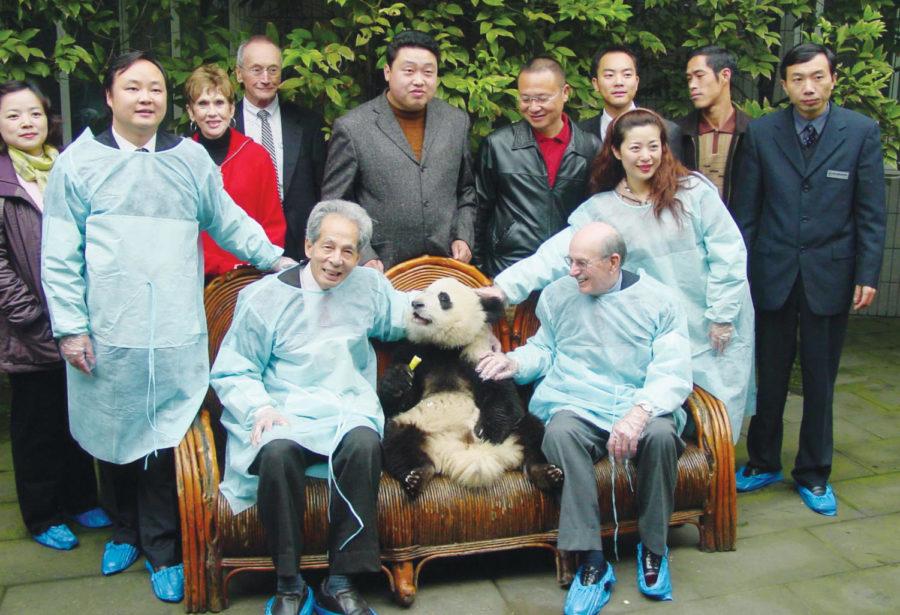Iowa State professor works to bring pandas to Des Moines
Paul Shao, sitting on left, professor of architecture, visits the Chengdu Research Base of Giant Panda Breeding in China in November 2004. Shao has been working to build a research park for pandas in Des Moines.
February 28, 2012
An ISU professor is trying to bring pandas to Des Moines with his proposed Iowa Giant Pandas Research Park.
Seven years ago, Paul Shao, professor of architecture, signed a long-term contract with the Chengdu Research Base of Giant Panda Breeding in China to loan Iowa a pair of giant pandas. He thinks now is the right time to start building his research park.
“The stars in heaven are aligned. This is the most opportune time to build the park” Shao said.
Shao explained there are many advantages he has to make this successful.
One advantage, he said, is the good relationship Iowa has with the people involved. Shao, who has been a part of the Chinese Cultural Center of America for 20 years now, built the Robert D. Ray Asian Gardens in Des Moines and the pavilion standing in it, which is the only one of its kind in America.
The recent visit of the vice president of China, Xi Jinping, also showed that Iowa’s relationship with China is good.
“Iowa has had a long-standing relationship with the Xi family, and now he is going to be the next president of China,” Shao said.
Another advantage, he explained, is Iowa’s excellence in biotechnology, especially here at Iowa State.
“Chengdu breeds pandas in captivity by artificial insemination because the female panda can only get pregnant one day a year,” Shao said. “But when pandas are bred in captivity, they lose their resistance to the germs out in the wild.”
There are others at Iowa State who contributed proposals to the project.
“Dr. En-Min [Eric] Zhou from the College of Veterinary Medicine contributed a proposal to find a vaccine to immunize the pandas with so they will not be so vulnerable to outside germs,” Shao said.
Further, Max Rothschild, distinguished professor of animal science who is known for his work with the pig genome, contributed a proposal to research the genome of giant pandas.
There was also a team, led by Patrick Schnable, a plant geneticist and professor of agronomy, that prepared a proposal having to do with research of bamboo.
One of the team members listed in Schnable’s proposal was Lynn Clark, professor of ecology, evolution and organismal biology.
“Since the proposal a few years ago, I don’t really consider myself part of the project, because I hadn’t heard anything of it for quite a while,” Clark said.
Schnable’s objective was to conduct research on bamboo and “generate transgenic bamboo with improved digestibility and nutritional characteristics that could be grown on former agricultural lands within and adjacent to the natural habitat of pandas,” according to the proposal.
“Bamboo doesn’t have a lot of nutritional value, so the pandas have to eat a lot of it to get enough nutrition to survive,” Clark explained.
Clark is an expert in bamboo diversity and evolution.
“To increase the bamboo’s nutritional value, genes must be introduced to the bamboo, which is not an easy process at all,” Clark said, “It’s a long-term project, and most people don’t want to invest in a long-term project if they don’t get something in return.”
Clark went on to explain that panda bears are expensive. She collaborated with Omaha’s Henry Doorly Zoo when it was thinking of getting pandas.
They looked at information from when the Atlanta and San Diego zoos got their pandas. Attendance spiked for the first year, but then fell back again, convincing the Omaha Zoo not to invest in pandas.
Shao, however, thinks pandas will be a major economic benefit.
“There are no pandas in the Midwest,” Shao said. “This will make these pandas a major tourist attraction, which will benefit Des Moines and create jobs.”
Despite skepticism, Shao is ready to put his energy into the research park.
“I am grateful to give something back to Iowa State University and the state of Iowa for the great opportunity I’ve had here,” Shao said.

















